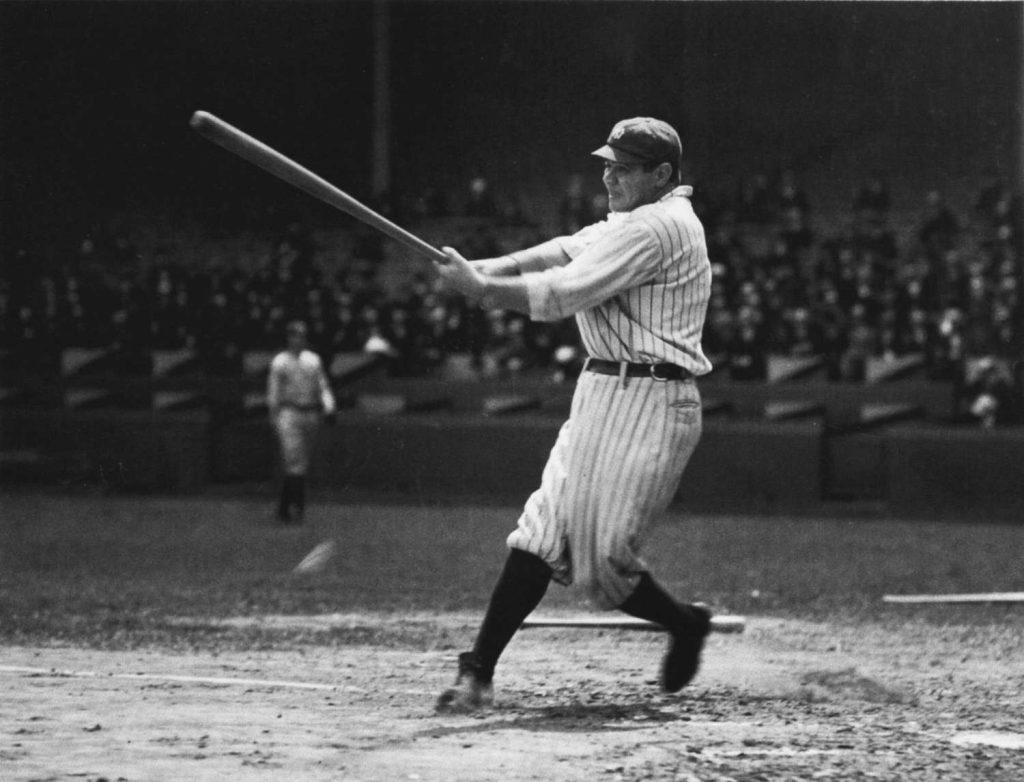In the pantheon of baseball legends, few names shine as brightly as that of George Herman “Babe” Ruth Jr. Born on February 6, 1895, in Baltimore, Maryland, Ruth’s impact on the game transcended mere statistics. He was more than just a baseball player; he was a cultural phenomenon whose larger-than-life persona captivated the nation and forever changed the sport.

Ruth’s journey to baseball immortality began in his early years, marked by tumult and adversity. Growing up in a working-class neighborhood, Ruth faced challenges from a young age. His parents, George Sr. and Kate, struggled to provide for their eight children, and Ruth was often left to his own devices. It was in the streets of Baltimore’s Pigtown neighborhood that Ruth honed his skills as a baseball player, catching the eye of Jack Dunn, owner of the Baltimore Orioles minor league team.
At the tender age of 19, Ruth was signed by Dunn and joined the Orioles, where he earned the nickname “Babe” due to his youthful appearance and naivety. His prodigious talent soon caught the attention of Major League Baseball scouts, and in 1914, Ruth was sold to the Boston Red Sox, marking the beginning of his storied major league career.
Initially a standout pitcher for the Red Sox, Ruth’s career took a dramatic turn when he was converted into a full-time outfielder to maximize his offensive potential. It was a decision that would forever alter the course of baseball history. Ruth’s impact on the game was immediate and profound. In an era dominated by small ball and strategy, Ruth revolutionized the sport with his unprecedented power and charisma.
During his tenure with the Red Sox, Ruth established himself as one of the most feared hitters in baseball, setting numerous records and leading the league in home runs multiple times. However, it was his controversial sale to the New York Yankees in 1920 that cemented his status as a baseball icon and forever changed the fortunes of both franchises.
In pinstripes, Ruth blossomed into a bona fide superstar, becoming the face of baseball during the “Roaring Twenties.” His towering home runs and larger-than-life personality captured the imagination of fans across the country, transforming him into a national hero. Ruth’s impact extended beyond the confines of the baseball diamond, as he became a symbol of hope and optimism during a time of social and economic upheaval.
One of the most enduring legacies of Ruth’s career is his role in popularizing the long ball and ushering in the era of the home run. His single-season record of 60 home runs, set in 1927, stood for nearly four decades and remains one of the most hallowed records in sports history. Ruth’s prodigious power and unmatched charisma turned baseball into America’s pastime and laid the groundwork for the modern game we know today.
Off the field, Ruth was a larger-than-life figure known for his extravagant lifestyle and larger-than-life personality. Despite his flaws and vices, including a well-documented appetite for excess, Ruth endeared himself to fans with his humility and generosity. He was a beloved figure who transcended the sport, leaving an indelible mark on the fabric of American culture.
In his later years, Ruth’s health began to deteriorate, and he succumbed to cancer on August 16, 1948, at the age of 53. His passing was mourned by millions of fans around the world, a testament to the lasting impact of his remarkable life and career.
Nearly a century after his final game, Babe Ruth remains synonymous with baseball greatness. His legend lives on in the record books, the stories passed down through generations, and the hearts of fans who continue to marvel at his unparalleled talent and enduring legacy. As long as there is baseball, there will be Babe Ruth, forever enshrined as the Sultan of Swat and baseball’s greatest icon.

